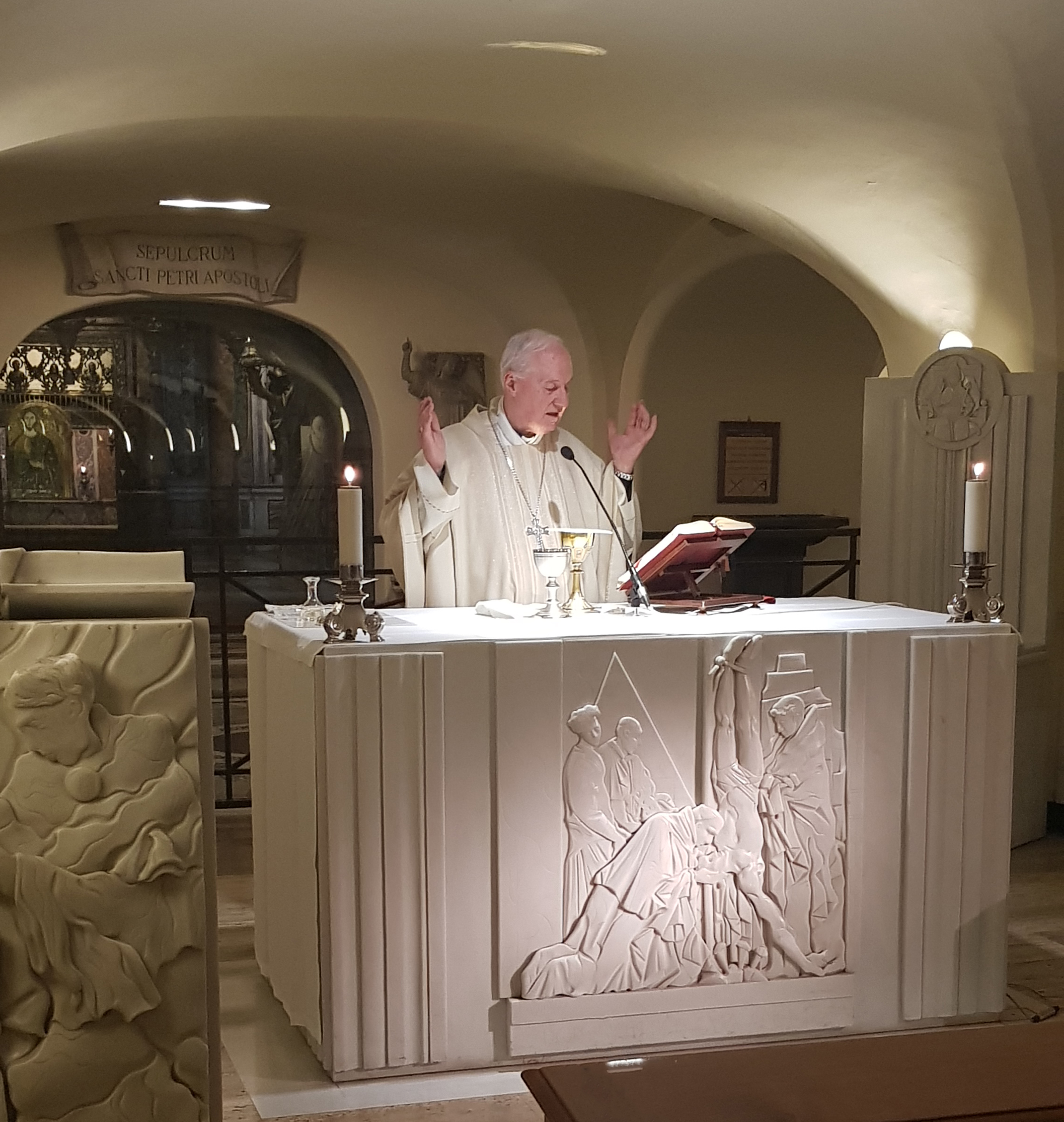+39 0669887260 | info@wucwo.org | Contact us
Formation
Cardinal Ouellet's Homily
 During our Board meeting 2019 we had the honor to celebrate mass at the Tomb of Saint Peter, in Saint Peter's Basilica in Rome, with Cardinal Marc Ouellet.
During our Board meeting 2019 we had the honor to celebrate mass at the Tomb of Saint Peter, in Saint Peter's Basilica in Rome, with Cardinal Marc Ouellet.
Below you can find Cardinal Ouellet's homily.
• “Christ had to suffer and rise from the dead to enter into his glory”
Dear friends,
We come on pilgrimage to St. Peter's tomb to be confirmed in our faith and strengthened in our Christian testimony. In the context of Peter's martyrdom, we are also strengthened by the teaching of his successor, Pope Francis. We welcome the grace of this meeting in Rome and give thanks for the gift of faith in these difficult times in the world and in the Church. "Do not let your hearts be troubled or cowed," Jesus tells us in the Gospel: "Peace I bequeath to you, my own peace I give you." This peace of Jesus Christ goes far beyond the relative peace we can experience in the world. It is the free gift of our reconciliation with God and among ourselves through the work of his death and resurrection.
I have sometimes asked Pope Francis how did he live the moments of great tension that the media sometimes reflect. He repeated to me several times: "You know, on the day of my election, a peace entered my soul and never abandoned me." This is the charism of Peter's successor. That is why he remains serene in all circumstances and does not allow himself to be disturbed by contradictions and criticisms. His rock is Christ crucified and risen, the conqueror of death.
Dear friends, you come here on pilgrimage with your intentions, needs and struggles. And you are open to what Rome can offer you in terms of support and encouragement. I am pleased to accompany you in this Eucharist and to express my appreciation for your commitment to the cause of women in the world and in the Church. I do not have the pleasure of knowing you very well, but the President knows that your mission is dear to me and that I share many of your aspirations so that the contribution of women may be more recognised and promoted in families, in the workplace and in leisure environments, as well as in the exercise of public responsibilities.
We have a delay which we have to make up in the Church about the recognition and integration of the charisms of women in the promotion of Christian communities and in the government of dioceses. The skills of listening, compassion and service that are natural for women are resources too often neglected and relegated to second place in a world dominated by power struggles between men. A more significant female presence is lacking in councils, synods, diocesan or Roman curia, as well as in the pastoral work in the field. This presence would help to cleanse the environment in situations of conflict and to create an atmosphere of mutual welcome, respect for others and sensitivity towards the most disadvantaged.
The Holy Father's call for true synodality in the Church at all levels implies listening to women and paying greater attention to their intuitions and abilities. We are still far from reaching the goal of transforming ecclesial culture and allowing it to being permeated with the feminine values of compassion, mercy and tenderness, thus making the evangelisation by attraction which our world needs more successful. The apostle Paul had to struggle and suffer much for the creation of Christian communities among the Gentiles; we too must continue the struggle and strengthen our testimony so that prejudices and discrimination against women are overcome, and women can contribute more to evangelisation and communion in the Church.
It is not about women taking the place of men in their specific position and competing with them in terms of influence. It is about women being women and their innate values being affirmed, so that a culture of communion can supplant the spirit of rivalry and the greed of power for power. It is love that moves the Church forward and allows women and men to develop. Let us pray that our way of promoting women everywhere will be inspired by love and will bear fruits of peace.
As disciples of Christ and missionaries of his Gospel, our first responsibility is always communion, the testimony of fraternal love, patience and forgiveness, as in the days of the first Christian communities that founded the Church of Rome.
Dear friends, I welcome your intentions and needs in the offering of the Lord's Paschal Sacrifice, source of our peace. Let us not neglect prayer, because women are naturally contemplative, open to the Holy Spirit and, therefore, capable of prophecy and hope at the service of the Kingdom. May the Virgin Mary accompany each one of you on this pilgrimage to the sources of faith and obtain for you, with the consolation of the Holy Spirit, the courage to advance with perseverance in promoting the cause of women and in building a true civilisation of love.